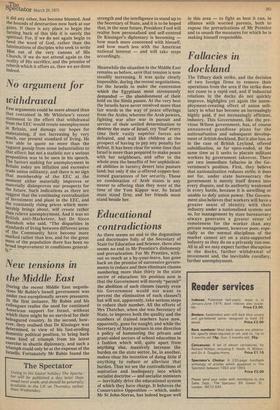Fallacies in dockland
The Tilbury dock strike, and the decision of two foreign firms to remove their operations from the area if the strike does not come to a rapid end, and if industrial relations in the docks do not quickly improve, highlights yet again the unemployment-creating effect of union militancy in what has become an increasingly highly paid, if not increasingly efficient, industry. This Government, like the previous Wilson government, has, of course announced grandiose plans for the nationalisation and subsequent development of aritish dockland. But it also has, as in the case of British Leyland, offered subsidisation, so far open-ended, at the same time as it seeks to placate militant workers by government takeover. There are two immediate fallacies in the Government's position. First, they believe that nationalisation reduces strife: it does not for, under state bureaucracy the government is merely itself drawn into every dispute, and its authority weakened in every battle, because it is unwilling or unable to defy union power. The Government also believes that workers will have a greater sense of identity with their industry under a nationalised system: not so, for management by state bureaucracy always generates a greater sense of remoteness for the worker than any private management, however poor, especially as the normal disciplines of the market cannot act on a state-supported industry as they do on a privately run one. All in all we may expect further disruption in the docks, further withdrawal of investment and, the inevitable corollary, further unemployment.


































 Previous page
Previous page